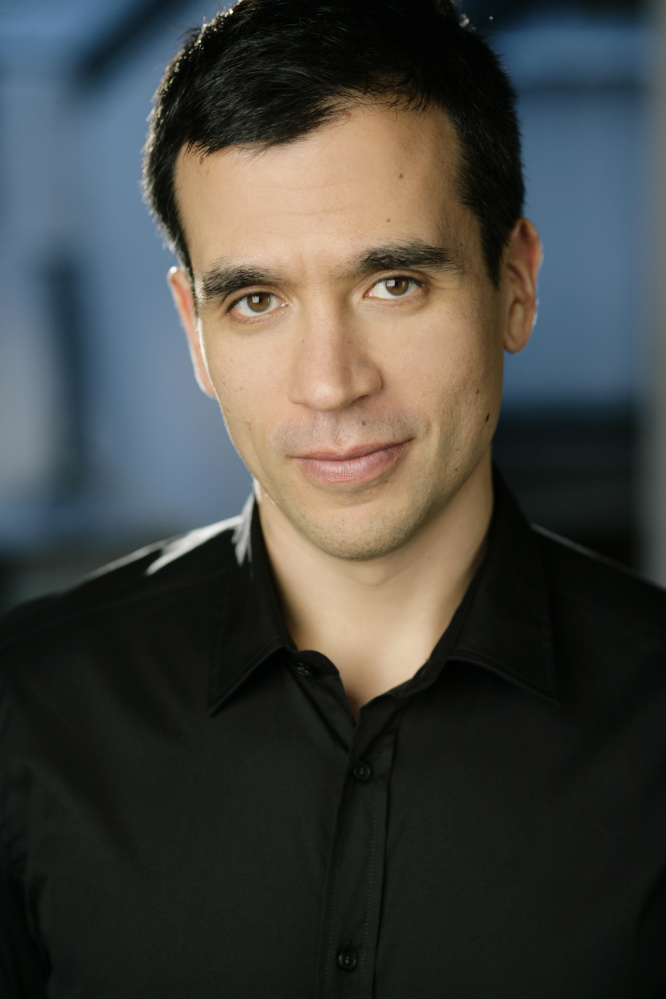In the decade since he won the Naumburg Competition, Thomas Meglioranza has built a busy career, both in the opera house and in the more intimate confines of the recital stage. His baritone voice is both commanding and subtle, and he is a superb actor, but he is especially compelling as a recitalist, particularly in contemporary music, where his ability to win over an audience with his warm tone and interpretive astuteness has served composers well. But as he reminded listeners at Bowdoin College’s Studzinski Recital Hall on Saturday afternoon, he is also a fine interpreter of the standard art song repertory.
Meglioranza and his pianist, Reiko Uchida, devoted the full program to the music of Hugo Wolf, one of the great song composers of the last half of the 19th century. They drew their selections entirely from Wolf’s “Mörike Lieder,” a collection of 53 settings of poetry by the German poet Eduard Mörike. Meglioranza sang 20 of the songs on the program proper, and another as his sole encore.
You can see what drew an inventive composer like Wolf to Mörike’s poetry. It is full of colorful word painting, to say nothing of the emotionalism that was a crucial engine of German poetry in his time. Some of the poems are delightfully idiosyncratic. In “Bei einer Trauung” (“At a Wedding”), Mörike describes an aristocratic wedding at which the faces of the bride and groom make it clear that the marriage is loveless. In “Zur Warnung” (“As a Warning”), a poet with a hangover summons his muse and is given nothing but useless verse. (The warning of the title is that poets should not summon the muse when they are hung over.)
Wolf responded to Mörike’s poems with music in which the piano lines are as descriptive as the texts, while the vocal lines touch on the poetry’s emotional core. When he describes a brief meeting of two young lovers on a stormy night, in “Begegnung” (“Encounter”), the piano captures the howling wind and the torrential rain, while the comparatively simple, direct vocal line offers the narrator’s wry thoughts about the lovers’ hopes and frustrations. And in “Der Feuerreiter” (“The Fire Rider”), the rumbling piano writing shows us a mill, consumed in flame, leaving the tension and drama of watching it burn – and the macabre discovery at the song’s end – to the singer.
Meglioranza grouped his selections thematically, more or less, with groups that looked at the poet’s meditations on the divine, the mysteries of night, and love and longing, with the final set a miscellany of peculiar scenes and observations. His voice is in fine shape, and admirably flexible: He drew on a range of techniques that ran from a harsh whisper (to evoke the hangover at the start of “Zur Warnung”) to a rich, full tone than projected nicely over the often busy keyboard figures. And more to the point, he moved through the vivid imagery of this varied collection with elegance and wit.
Uchida is also a player of considerable experience accompanying vocalists and instrumentalists, and having worked with Meglioranza for a decade, she knows his timbres and shadings well enough to play Wolf’s often complex piano lines assertively, secure in the knowledge that she was unlikely to cover the singer. Theirs is a superbly balanced partnership, and precisely what these evocative songs demand.
Allan Kozinn is a former music critic and culture writer for The New York Times who lives in Portland. He can be contacted at:
allankozinn@gmail.com
Twitter: kozinn
Send questions/comments to the editors.



Success. Please wait for the page to reload. If the page does not reload within 5 seconds, please refresh the page.
Enter your email and password to access comments.
Hi, to comment on stories you must . This profile is in addition to your subscription and website login.
Already have a commenting profile? .
Invalid username/password.
Please check your email to confirm and complete your registration.
Only subscribers are eligible to post comments. Please subscribe or login first for digital access. Here’s why.
Use the form below to reset your password. When you've submitted your account email, we will send an email with a reset code.